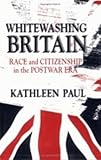Whitewashing Britain : Race and Citizenship in the Postwar Era / Kathleen Paul.
Material type: TextPublisher: Ithaca, NY : Cornell University Press, [2018]Copyright date: ©1997Description: 1 online resource (272 p.) : 15 halftonesContent type:
TextPublisher: Ithaca, NY : Cornell University Press, [2018]Copyright date: ©1997Description: 1 online resource (272 p.) : 15 halftonesContent type: - 9781501729331
- Citizenship -- Great Britain
- Racism -- Great Britain
- Discrimination & Race Relations
- England
- History
- HISTORY / Europe / Great Britain / General
- British Politics history
- British Politics
- British emigration
- British immigration policy post-war
- British immigration policy
- British politics of race
- Britishness
- Civics & Citizenship
- Commonwealth studies
- Comparative Immigration Politics
- Falklands War citizenship
- Falklands War history
- Falklands War
- Great Britain Racism
- International Migration
- Labour government
- West Indian immigrants to britain
- West Indian immigrants
- british citizenship history
- british discrimination
- british immigration policy
- british late-imperialism
- british nationality policy
- british post-war racism
- british racism
- british studies
- citizenship studies
- citizenship
- cultural politics of race in england
- england history
- englishness and empire
- history of British immigration
- immigrants from Commonwealth nations
- immigration studies
- migration studies
- politics of citizenship
- post-war British policy
- post-war concepts of citizenship
- postwar policy-making
- race and racism in britain
- racism of ministers
- 325.41/09/045 23
- online - DeGruyter
| Item type | Current library | Call number | URL | Status | Notes | Barcode | |
|---|---|---|---|---|---|---|---|
 eBook
eBook
|
Biblioteca "Angelicum" Pont. Univ. S.Tommaso d'Aquino Nuvola online | online - DeGruyter (Browse shelf(Opens below)) | Online access | Not for loan (Accesso limitato) | Accesso per gli utenti autorizzati / Access for authorized users | (dgr)9781501729331 |
Frontmatter -- Contents -- Illustrations -- Preface -- INTRODUCTION. The Road from 1945 -- CHAPTER ONE. Subjects and Citizens -- CHAPTER TWO. Emigrating British Stock -- CHAPTER THREE. Recruiting Potential Britons -- CHAPTER FOUR. Neither Subjects nor Aliens but Irish -- CHAPTER FIVE. Keeping Britain White -- CHAPTER SIX. Tinkering at the Edges of Nationality -- CHAPTER SEVEN. Still the Same Old Story -- Notes -- Index
restricted access online access with authorization star
http://purl.org/coar/access_right/c_16ec
Kathleen Paul challenges the usual explanation for the racism of post-war British policy. According to standard historiography, British public opinion forced the Conservative government to introduce legislation stemming the flow of dark-skinned immigrants and thereby altering an expansive nationality policy that had previously allowed all British subjects free entry into the United Kingdom. Paul's extensive archival research shows, however, that the racism of ministers and senior functionaries led rather than followed public opinion. In the late 1940s, the Labour government faced a birthrate perceived to be in decline, massive economic dislocations caused by the war, a huge national debt, severe labor shortages, and the prospective loss of international preeminence. Simultaneously, it subsidized the emigration of Britons to Australia, Canada, and other parts of the Empire, recruited Irish citizens and European refugees to work in Britain, and used regulatory changes to dissuade British subjects of color from coming to the United Kingdom. Paul contends post-war concepts of citizenship were based on a contradiction between the formal definition of who had the right to enter Britain and the informal notion of who was, or could become, really British.Whitewashing Britain extends this analysis to contemporary issues, such as the fierce engagement in the Falklands War and the curtailment of citizenship options for residents of Hong Kong. Paul finds the politics of citizenship in contemporary Britain still haunted by a mixture of imperial, economic, and demographic imperatives.
Mode of access: Internet via World Wide Web.
In English.
Description based on online resource; title from PDF title page (publisher's Web site, viewed 26. Apr 2024)


